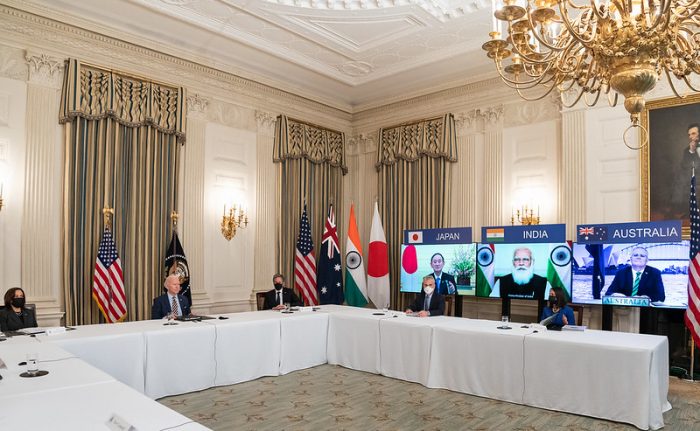The ambitions and reality of the Quad
Posted By Huong Le Thu and Sarah Teo on June 15, 2021 @ 12:30

The Quadrilateral Security Dialogue has been the venue for the most visible foreign policy signalling on the Indo-Pacific from US President Joe Biden since he assumed office in January. In March, Biden convened the first Quad leaders’ summit with his counterparts from Australia, India and Japan, though attention on this cooperative arrangement, and its potential, had been growing even before then. The anticipation of the Quad’s new Covid-19 vaccine partnership is adding both to the forum’s relevance and to the challenges it faces in meeting expectations.
Considering that closer cooperation among Quad members has been attributed to China’s assertiveness, the recent statement [1] by US Indo-Pacific coordinator Kurt Campbell that ‘the dominant paradigm [in US policy towards China] is going to be competition’ suggests the potential for the grouping to become one of the main vehicles to compete with China. There has been talk [2], for instance, of the Quad offering an alternative to China’s Belt and Road Initiative through quality infrastructure partnerships.
In some ways, the Quad has come a long way since it was revived in 2017. Initial doubts about Quad 2.0 [3]’s sustainability have been juxtaposed against its evolution from a meeting of senior officials, to one at the foreign ministers’ level, to the inaugural leaders’ summit. Its agenda has also expanded substantially. From its origins as a core group responding to the aftermath of the Indian Ocean tsunami in 2004, the Quad now seeks to facilitate collaboration on a wide range of issues. Working groups have been established [4] to advance cooperation on Covid-19 vaccines, critical and emerging technologies, and climate change. The first-ever joint statement also identified [5] counterterrorism and maritime security as potential areas for cooperation.
Although the Quad began as a clear-cut example of minilateralism [6]—small, informal and targeted specifically at delivering humanitarian assistance—recent developments indicate that it is evolving into a more formal platform with a much more comprehensive agenda.
Increasingly, there is nothing ‘mini’ about this group of major actors in the Indo-Pacific—not in its capacity, its ambition, or even its composition: the Quad is keen to involve as many like-minded partners as possible in expanding its ‘Quad Plus’ mechanisms. In fact, the Quad faces complex and all-encompassing challenges, from defending the rules-based order to containing potential revisionism, promoting democracy and setting norms and standards. These are not jobs for a minilateral or an ad hoc cooperation initiative. (Expectations that the Quad will transform into an ‘Asian NATO [7]’ or a substitute for the UN Security Council, however, are imaginative, but overblown.)
The primary challenge for the Quad is to identify the main ways in which it can make a difference and contribute to stability in the Indo-Pacific. The first incarnation of the Quad fell into lethargy due to lack of sufficiently strong alignment and commitment among the four members. The main challenges then were Quad countries’ diversity of national interests in the face of external pressures, particularly from China.
The elevated Quad 2.0 demonstrates the persistent interest of the four countries in the mechanism, and some realignment of their views on China. But perhaps the greatest area of uncertainty lies in the expectations, both internal and external, for what the Quad can deliver. As the Biden administration’s first major foreign-policy accomplishment, the Quad leaders’ summit reflects the priority that Washington now places on the platform, with the hope that it will become [8] ‘a new feature of regular diplomacy in the Indo-Pacific’.
Even as the Quad’s cooperative efforts extend across an increasing number of sectors, the likelihood that it will overstretch and overpromise remains. If not well managed, Quad cooperation could flounder for a second time, which would derail the momentum that the platform has gained over the past few years.
For instance, the vaccine partnership—a welcome initiative, even among those who have reservations about the Quad and its ‘containment agenda’—faces challenges. Quad members continue to struggle with the pandemic themselves (as we’ve seen with the recent massive surge in Covid-19 cases in India and Australia’s faltering vaccine rollout), which will make it difficult for them to deliver on their plans. While members enthusiastically support the initiative, if Covid-19 continues to wreak havoc among Quad members, particularly India, there will be limits to what they can collectively commit to the rest of the Indo-Pacific region.
Assuming the Quad can sustain its impetus for cooperation, its long-term potential remains formidable. However, its ability to become a regular part of the regional architecture will be determined by a few factors. First, its key proponents will need to craft an agenda that fits with the interests and commitment levels of all four members. It will also have to succeed in establishing positive relations with non-Quad countries. Finally, and perhaps most importantly, it will need to strike a balance between harnessing the group’s potential and momentum and overstretching and overpromising.
Article printed from The Strategist: https://www.aspistrategist.org.au
URL to article: https://www.aspistrategist.org.au/the-ambitions-and-reality-of-the-quad/
URLs in this post:
[1] statement: https://www.straitstimes.com/asia/east-asia/no-more-engagement-with-china-its-competition-says-us-official
[2] talk: https://www.reuters.com/article/us-china-beltandroad-quad-idUSKCN1G20WG
[3] Quad 2.0: https://s3-ap-southeast-2.amazonaws.com/ad-aspi/2019-02/SI134%20Quad%202.0%20New%20perspectives_0.pdf?VersionId=Ml2ECFvmUJTTFzK.RsBIsskCRRAqEmfP
[4] established: https://www.whitehouse.gov/briefing-room/statements-releases/2021/03/12/fact-sheet-quad-summit/
[5] identified: https://www.pm.gov.au/media/quad-leaders-joint-statement-spirit-quad
[6] minilateralism: https://www.routledge.com/Minilateralism-in-the-Indo-Pacific-The-Quadrilateral-Security-Dialogue/Singh-Teo/p/book/9780367430382
[7] Asian NATO: https://asiatimes.com/2021/03/quad-summit-next-step-towards-an-asian-nato/
[8] become: https://www.reuters.com/article/usa-biden-quad/biden-to-meet-virtually-with-leaders-of-japan-india-australia-idUSKBN2B21V7
Click here to print.